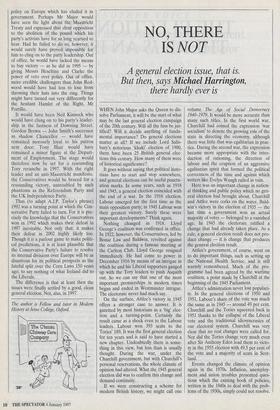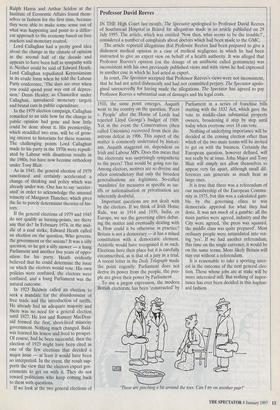NO, THERE IS NOT
A general election issue, that is.
But then, says Michael Harrington,
there hardly ever is
WHEN John Major asks the Queen to dis- solve Parliament, it will be the start of what may be the last general election campaign of the 20th century. Will all the fuss be jus- tified? Will it decide anything of funda- mental importance? Do general elections matter at all? If we include Lord Salis- bury's notorious 'khaki' election of 1900, there have been 25 British general elec- tions this century. How many of them were of historical significance?
It goes without saying that political histo- rians have to start and stop somewhere, and general elections can be useful punctu- ation marks. In some years, such as 1918 and 1945, a general election coincided with the end of a war. In the 1918 election, Labour emerged for the first time as the main opposition party; in 1945 Labour won their greatest victory. Surely these were important developments? Think again.
Nothing changed in 1918. Lloyd George's coalition was confirmed in office. In 1922, however, the Conservatives, led by Bonar Law and Baldwin, revolted against the coalition during a famous meeting at the Carlton Club. Lloyd George resigned immediately. He had come to power in December 1916 by means of an intrigue in which he and his Liberal supporters ganged up with the Tory leaders to push Asquith out. So we can say that one of the most important premierships in modern times began and ended in Westminster intrigue. The electorate never had much say.
On the surface, Attlee's victory in 1945 offers a stronger case to answer. It is gazetted by most historians as a 'big' elec- tion and a turning-point. Certainly the result came as a shock even to the Labour leaders. Labour won 393 seats to the Tories' 189. It was the first general election for ten years and is said to have started a new chapter. Undoubtedly there is some- thing in this view, but less than is usually thought. During the war, under the Churchill government, but with Churchill's personal reservations, the whole climate of opinion had altered. What the 1945 general election did was to confirm this change and demand continuity.
If we were constructing a scheme for modern British history, we might call one volume The Age of Social Democracy 1940-1979. It would be more accurate than many such titles. In the first world war, Churchill had coined the expression 'war socialism' to denote the growing role of the state in directing the economy, although there was little that was egalitarian in prac- tice. During the second war, the expression became more appropriate with the intro- duction of rationing, the direction of labour and the eruption of an aggressive egalitarian spirit that formed the political correctness of the time and against which writers like Evelyn Waugh railed in vain.
Here was an important change in nation- al thinking and public policy which no gen- eral election had brought about. Churchill and Attlee were corks on the water. Bald- win's victory in the election of 1935 — the last time a government won an actual majority of votes — belonged to a vanished age. In 1945 the electorate ratified a change that had already taken place. As a rule, a general election result does not pro- duce change — it is change that produces the general election result.
Attlee's government, of course, went on to do important things, such as setting up the National Health Service, and is still warmly remembered. Much of the pro- gramme had been agreed by the wartime coalition, a point made by Churchill at the beginning of the 1945 Parliament.
Attlee's admistration never lost populari- ty. In the general elections of 1950 and 1951, Labour's share of the vote was much the same as in 1945 — around 49 per cent. Churchill and the Tories squeezed back in 1951 thanks to the collapse of the Liberal vote and the traditional idiosyncrasies of our electoral system. Churchill was very clear that no real changes were called for. Nor did the Tories change very much even after Sir Anthony Eden lead them to victo- ry in the 1955 election with 49.5 per cent of the vote and a majority of seats in Scot- land.
Events changed the climate of opinion again in the 1970s. Inflation, unemploy- ment and union troubles presented ques- tions which the existing book of policies, written in the 1940s to deal with the prob- lems of the 1930s, simply could not resolve. Ralph Harris and Arthur Seldon at the Institute of Economic Affairs found them- selves in fashion for the first time, because they were able to make some sense out of what was happening and point to a differ- ent approach to the economy based on free markets and monetary control.
Lord Callaghan had a pretty good idea about the change in the climate of opinion in the second half of the decade and appears to have been half in sympathy with it. Neither could be said of Edward Heath. Lord Callaghan repudiated Keynesianism in its crude form when he told the Labour Party conference, 'The days are over when you could spend your way out of depres-' sion.' Denis Healey, as Chancellor under Callaghan, introduced monetary targets and brutal cuts in public expenditure.
In the 1979 election campaign, Callaghan remarked to an aide how far the change in public opinion had gone and how little could be done about it. His premiership, which straddled two eras, will be of grow- ing interest to historians for these reasons. The challenging points Lord Callaghan made to his party in the 1970s were repudi- ated by Labour with disastrous results in the 1980s, but have now become orthodoxy under Tony Blair.
As in 1945, the general election of 1979 sanctioned and certainly accelerated a change of thinking and policy which was already under way. One has to say 'acceler- ated' in order to acknowledge the unusual tenacity of Margaret Thatcher, which gives the lie to purely determinist theories of his- tory.
If the general elections of 1979 and 1945 do not qualify as turning-points, are there any that do? In February 1974, in the mid- dle of a coal strike, Edward Heath called an election on the question, Who governs, the government or the unions? It was a silly question, so he got a silly answer — a hung Parliament and another five years of oppo- sition for his party. Heath evidently believed that he could determine the issue on which the electors would vote. His own policies were confused, the electors were confused, and a hung Parliament was the natural outcome.
In 1923 Baldwin called an election to seek a mandate for the abandonment of free trade and the introduction of tariffs. He already had an adequate majority and there was no need for a general election until 1927. He lost and Ramsay MacDon- ald formed the first, short-lived minority government. Nothing much changed. Bald- win learned his lesson and lived to prosper. Of course, had he been successful, then the election of 1923 might have been cited as one of the few elections that decided a major issue — at least it would have been so interpreted. In the event, the result sup- ports the view that the electors expect gov- ernments to get on with it. They do not reward politicians who keep coming back to them with questions.
If we look at the two general elections of 1910, the same point emerges. Asquith went to the country on the question, 'Peers v. People' after the House of Lords had rejected Lloyd George's budget of 1909. Yet in the event the Conservatives (then called Unionists) recovered from their dis- astrous defeat in 1906. This aspect of the matter is commonly underrated by histori- ans. Asquith staggered on, dependent on Irish and Labour MPs. Does this mean that the electorate was surprisingly sympathetic to the peers? That would be going too far. Among electors, motives are so diverse and often contradictory that only the broadest generalisations are legitimate. So-called `mandates' for measures as specific as tar- iffs or nationalisation or privatisation are inherently doubtful.
Important questions are not dealt with by the electors. If we think of Irish Home Rule, war in 1914 and 1939, India, or Europe, we see the governing elites debat- ing the matter and eventually dealing with it. How could it be otherwise in practice? Britain is not a democracy — it has a mixed constitution with a democratic element. Aristotle would have recognised it as such. Elections have their place but it is carefully circumscribed, as is that of a jury in a trial. A recent letter in the Daily Telegraph made the point cogently: Parliament does not derive its power from the people, the peo- ple are given their power by Parliament.
To use a jargon expression, the modern British electorate has been 'constructed' by Parliament in a series of franchise bills starting with the 1832 Act, which gave the vote to middle-class substantial property owners, broadening it step by step until today when everyone over 18 can vote.
Nothing of underlying importance will be decided at the coming election other than which of the two main teams will be invited to get on with the business. Certainly the European question, however defined, will not really be at issue. John Major and Tony Blair will simply not allow themselves to appear very far apart, although small dif- ferences can generate as much heat as large ones.
It is true that there was a referendum of our membership of the European Commu- nity in 1975, but this was a calculated gam- ble by the governing elites to win democratic approval for what they had done. It was not much of a gamble: all the main parties were agreed, industry and the City were agreed, 'the press was squared, the middle class was quite prepared'. Most ordinary people were intimidated into vot- ing 'yes'. If we had another referendum, this time on the single currency, it would be on the same terms. More likely Britain will stay out without a referendum.
It is reasonable to take a sporting inter- est in the outcome of the next general elec- tion. Those whose jobs are at stake will be more interested still. But nothing of impor- tance has ever been decided in this haphaz- ard fashion.
`These are pinching a bit around the toes. Can I try on another pair?'



























































 Previous page
Previous page